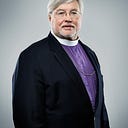Once hailed on TIME Magazine’s cover in 1970 as “the finest philosophic thinker of the 20th century,” [1] it might be fun to have a “who is” question for Jeopardy. Who is Arendt, Heidegger, Langer, Rawls, Rorty, Sartre, Weil, Wittgenstein — ?
Nope.
TIME was referring to Bernard Lonergan. A Jesuit, no less. And a theologian. And while he is mostly remembered today as a philosophical theologian, Lonergan himself thought that his most important work was neither in theology nor philosophy, but in economics. Among the twenty-five volumes of his Collected Works, two continue to be widely read, Insight: A study in human understanding; and Method in Theology.[2]
Insight is epistemology, therefore philosophy. It is pedagogical in intent, inviting the reader to discover their intellect at work. It is long and difficult, not because Lonergan’s style is turgid, but because a great deal is covered. He was a mathematician, a physicist, a philosopher who cut his teeth on Hegel before studying Aquinas, and a theologian whose main concern in that area was to try to get Christians to think historically. Finally, Lonergan was an economist well versed in that field but who took a bold step forward. (The purpose of his economics, he once said, was to help ensure that “the widows and orphans won’t starve.”[3])
